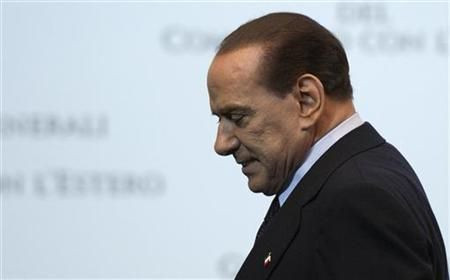Members of Berlusconi's Party Call for Resignation

Pressure mounted on Italy's besieged premier Silvio Berlusconi to quit Thursday as six former parliamentary loyalists called for a new government and the squabbling Cabinet failed to agree an urgent economic reform program.
The rebel deputies, three of whom have already left Berlusconi's crumbling government, wrote to the premier saying Italy needed a new political phase and a new government.
We are asking you to take an initiative which is appropriate to the situation, the deputies wrote, according to the letter published in the daily Corriere della Sera.
Be the backer of a new political phase and a new government which would have the task, from now until the end of the legislative term, of implementing the agenda agreed with our European partners and with it, the indications which came from the European Central Bank.
Il Giornale, a strongly pro-Berlusconi newspaper owned by the prime minister's brother, reported the issuing of the letter under the headline The Night of the Traitors.
Berlusconi, struggling to contain open divisions in his center-right coalition, failed to win support at a cabinet meeting late on Wednesday for the comprehensive reform program to stimulate growth and cut Italy's massive debt that he wanted to take to a G20 meeting in Cannes.
Berlusconi's supporters accused Economy Minister Giulio Tremonti, a constant thorn in his side, of blocking a deal.
Instead of a decree that could have been put into action immediately, the meeting merely agreed on a so-called maxi amendment, containing a number of measures to add to a budget bill currently before the Senate.
A government statement said the amendment was in line with what had been agreed with EU partners at a summit last week but contained no details. An official said the package included tax breaks for infrastructure investment, simplifying bureaucracy and helping youth employment though apprenticeships.
NEW PRESSURE ON GOVERNMENT BONDS
With doubts over Greece's future in the euro zone already causing havoc in the markets, the renewed political uncertainty in Rome racked up pressure on Italian government bonds.
Yields on 10-year BTP bonds hit more than 6.3 percent, creeping closer to the level of 7 percent which many analysts believe would be unsustainable.
The risk premium over benchmark German Bunds rose to 462 points, the widest spread since 1995, while the blue chip FTSE MIB stocks index was down 1.57 percent.
With Greece teetering on the brink of leaving the euro, the future of the single currency could now depend on preventing a meltdown in Italy, which would overwhelm the bloc's current defense mechanisms.
Rome's borrowing costs have been capped since August by the European Central Bank's bond-buying program but as the crisis has spread and concerns about Italy's towering public debt have grown, its intervention has become less and less effective.
Market concern about the euro zone's third largest economy was underlined by French bank BNP Paribas, which reported on Thursday that it had slashed its sovereign exposure to Italy by 8.3 billion euros, or 40 percent.
Berlusconi is due to meet leaders including German Chancellor Angela Merkel and French President Nicolas Sarkozy at the Cannes meeting on Thursday.
He has rejected a growing chorus of calls to step aside, from groups ranging from the center-left opposition to business and banking associations, unions, the Catholic church and now rebels in his own PDL party.
President Giorgio Napolitano said Tuesday he was sounding out the extent of support for reform from political forces outside the ruling center right, suggesting he was contemplating the possibility of a broad-based national unity government.
The head of state does not have the power to dismiss a government with a parliamentary majority but as growing numbers of PDL deputies desert Berlusconi, the opposition believe they could have the numbers to topple him.
(Editing by Barry Moody)
© Copyright Thomson Reuters {{Year}}. All rights reserved.





















